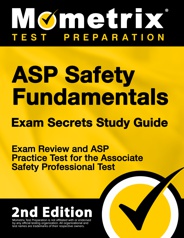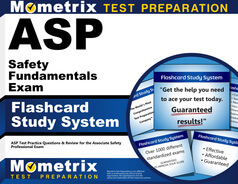The Associate Safety Professional (ASP) exam is designed to assess your fundamental safety, health, and environmental knowledge and skills as you pursue ASP certification.
This page covers everything you need to know about the ASP exam, such as what information the examination covers, the number and type of questions you can expect, and what score you need to pass.
ASP Eligibility
To be eligible for the exam, you must meet all of the following requirements:
- You must have at least a bachelor’s degree in any field, OR you must have an associate degree in health, safety, or the environment
- You must have at least one year of safety experience
ASP Exam Outline
The ASP exam contains 200 multiple-choice questions and has a time limit of 5 hours.
The exam is split into nine domains, and the questions in each domain are split into skills- and/or knowledge-based.
1. Advanced Sciences and Math (11.55%)
The questions in this domain are all knowledge-based and evaluate the following:
- Noise hazards
- General chemistry concepts
- Financial principles
- Lagging indicators
- Leading indicators
- Electrical principles
- Rigging and load calculations
- General physics concepts
- Climate and environmental conditions
- Radioactivity principles
- Storage capacity calculations
- Descriptive statistics
- Fall protection calculations
- Ventilation and system design
2. Safety Management Systems (17.22%)
The knowledge-based questions in this domain evaluate the following:
- Confined spaces
- Management of change
- Scaffolding
- Physical security
- Process safety management
- Risk transfer
- Machine guarding
- Excavation, shoring, and trenching
- Fleet safety principles
- Hazard and risk analysis methods
- Fall protection
- Powered industrial vehicles
- Control of hazardous energy
The skills-based questions in this domain test your ability to implement hazard controls, use hazard identification methods, conduct inspections and audits, provide financial justification of hazard controls, assess and analyze risks, and evaluate the cost, schedule, performance, and project risks.
3. Ergonomics (9%)
The knowledge-based questions in this domain evaluate the following:
- Work design
- Fitness for duty
- Work practice controls
- Stressors
- Risk factors
- Material handling
The skills-based questions in this domain test your ability to use quantitative and qualitative analysis methods.
4. Fire Prevention and Protection (10.66%)
The questions in this domain are all knowledge-based and evaluate the following:
- Combustible dust
- Housekeeping
- Chemical and electrical components
- Detection systems
- Hot work
- Segregation and separation
- Fire science
- Suppression systems
- Detection systems
5. Emergency Response Management (9.75%)
The questions in this domain are all knowledge-based and evaluate the following:
- Workplace violence
- Emergency planning
- Disaster response planning
- Crisis planning
6. Industrial Hygiene and Occupational Health (12.59%)
The knowledge-based questions in this domain evaluate the following:
- Noise
- Heat and cold stress
- Protocol for bloodborne pathogen control
- Acute and chronic exposures
- Mutagens, teratogens, and carcinogens
- Sources of biological hazards
- Radiation
- Chemical hazards
- Routes of entry
The skills-based questions in this domain test your ability to conduct exposure assessments.
7. Environmental Management (8.68%)
The questions in this domain are all knowledge-based and evaluate the following:
- Air and water
- Waste removal, treatment, and disposal
- Environmental hazard awareness
- Land and conservation
- Environmental management system standards
- Hierarchy of conservation
8. Training, Education, and Communication (12.35%)
The questions in this domain are all knowledge-based and evaluate the following:
- Safety culture/climate
- Presentation tools
- Assessing competency
- Presentation tools
- Data collection, needs analysis, gap analysis, and feedback
9. Law and Ethics (8.38%)
The knowledge-based questions in this domain evaluate the following:
- Legal liability
- Protection of worker privacy
- Ethical behavior
The skills-based questions in this domain test your ability to read and interpret regulations, deal with unethical situations, and determine the appropriate course of action based on limitations of knowledge.
Check Out Mometrix's ASP Study Guide
Get practice questions, video tutorials, and detailed study lessons
Get Your Study Guide
Registration
To register for the ASP exam, you must first create an online BCSP account. Through your account, you can then select “ASP” as your certification of choice and fill out the application. You will be asked to provide your contact information, proof of your BSCP-qualified credential, and your experience and education information.
Once the ASP application is filled out, you will need to submit it along with the $160 application fee.
Once your application is approved, you will have a full year from the date of approval to register and sit for the exam. During registration, you will need to pay the exam fee of $350. You can schedule your exam at any time with Pearson VUE.
ASP Online Prep Course
If you want to be fully prepared, Mometrix offers an online ASP prep course designed to give you everything you need to succeed!
Here’s what you’ll find in the ASP course:
- 70+ Review Lessons Covering Every Topic
- 800 ASP Practice Questions
- 300+ Digital Flashcards
- Money-back Guarantee
- Mobile Access
Everyone learns differently, so we’ve tailored the ASP online prep course to ensure every learner has what they need to prepare for the ASP exam.
Click below to check it out!
Test Day
You should arrive at the Pearson VUE testing center about 30 minutes earlier than the exam appointment time. After you arrive, you will be asked to sign in and present your photo ID to the proctor. You will be photographed and asked to sign a roster and other rule forms.
Personal items are not allowed in the testing room, so they should be left at home or in your car. This includes your phone, wallet, keys, bags, books, notes, and accessories.
Just before the exam starts, you will be given a brief tutorial on the testing system. You will also be given everything you need to work out any calculations by hand (no calculator will be provided).
BCSP uses the modified-Angoff method and the Bookmark Standard Setting method to establish the scores for the ASP exam. These methods are used to ensure that your score is based entirely on your testing performance and does not rely on how well other test-takers performed.
As long as you achieve the minimum cumulative score for the entire test, you will have passed, even if you did not pass all six domains individually.
Even though you don’t need to pass each individual domain, your score report will show you how you performed on each one. This is useful for understanding your strengths and weaknesses, especially if you did not pass and need to retake the exam. Currently, the minimum passing score is 61%.
Check Out Mometrix's ASP Flashcards
Get complex subjects broken down into easily understandable concepts
Get Your Flashcards



